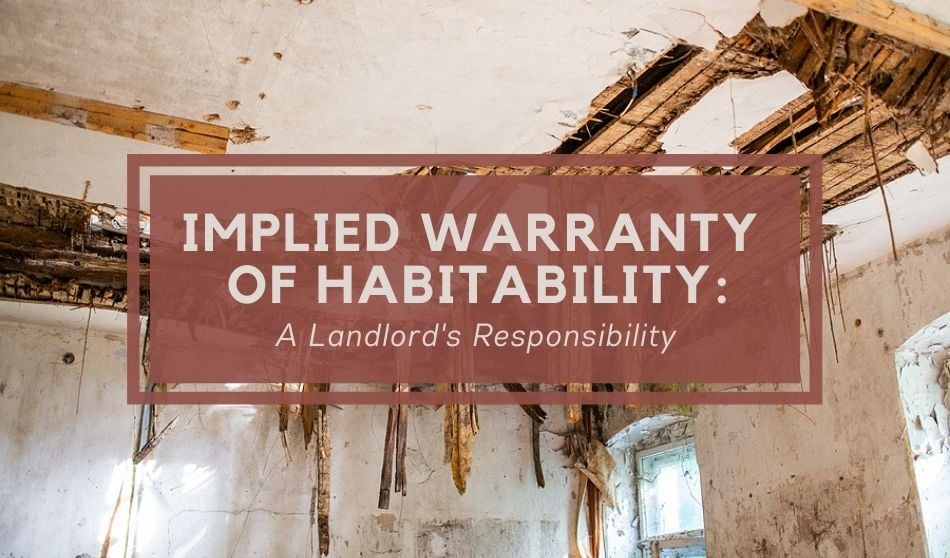 Housing providers, like landlords and property managers, are responsible for providing their tenants with a safe and livable home. Most states refer to the exchange of rent for a safe, livable home between a landlord and tenant as the implied warranty of habitability.
Housing providers, like landlords and property managers, are responsible for providing their tenants with a safe and livable home. Most states refer to the exchange of rent for a safe, livable home between a landlord and tenant as the implied warranty of habitability.
Nolo’s legal team explains that the term implied warranty of habitability comes from local building codes and state statutes that specify minimum requirements for essential services such as heat, water, and plumbing. Additionally, your state laws will define terms in which a tenant can withhold rent or attempt to fix an issue if the property does not meet the warranty standards.
Every landlord should check with their state laws about the exact ways in which they are expected to meet the implied warranty of habitability requirements. Some state statutes will specifically use the term “implied warranty of habitability” while others refer to the idea under landlord responsibilities and use terms like “fit for human habitation” or “fit for occupation by human beings”.
For example, rental laws in Oregon require that landlords shall at all times maintain the unit in a habitable condition. According to Or. Rev. Stat. § 90.320(1), Oregon recognizes the following conditions as uninhabitable if it severely lacks:
- Effective waterproofing and weather protection
- Working plumbing facilities
- Hot and cold water
- A water supply that provides safe drinking water; hot and cold water; is connected to a sewage disposal system
- Adequate heating facilities
- Working electrical lighting, wiring, and equipment
- Clean and sanitary conditions
- Floors, walls, ceiling, stairways, and railing maintained in good repair
- Safety from fire hazards
- Working smoke and carbon monoxide alarms
- Working locks
Oregon law further stipulates that if an Oregon landlord fails to provide essential services (water, heat, etc.) a tenant may withhold rent under Or. Rev. Stat. § 90.365.
Other states like California, provide an exact definition for implied warranty of habitability, “A rental unit must be fit to live in; that is, it must be habitable. In legal terms, “habitable” means that the rental unit is fit for occupation by human beings and that it substantially complies with state and local building and health codes that materially affect tenants’ health and safety. (Cal. Civ. Code §§ 1941)
While most states define specific requirements for their landlords to follow, other states do not define any implied warranty conditions for a landlord-tenant relationship. For instance, in Arkansas, according to the Arkansas Attorney General, a tenant who rents a residence takes it as is, and the landlord has no further obligation to maintain the premises. The only obligation the landlord has is to meet city building codes.
An attorney familiar with landlord-tenant laws in your state will help you defer any ambiguity in the legal code when it comes to your duty as a housing provider.
If you are wondering what the implied warranty of habitability requirements are for your state, landlord.com put together a list of the state habitability statutes and possible tenant remedies as defined by state landlord-tenant laws.
State Habitability Statutes & Law Reference Guide
According to Cornell University’s Legal Information Institute, “ the implied warranty requires landlords to keep their property “habitable,” even if the lease does not specifically require them to make repairs. Furthermore, the warranty conditions a tenant’s duty to pay rent on the landlord’s duty to maintain a habitable living space. This makes it easier for tenants to get landlords to make repairs.”
This warranty is controversial. Supporters argue that it protects poor tenants from abusive landlords. Detractors argue that it drives up housing prices, encourages landlords to abandon old buildings, and turns landlords into public utilities, explains Cornell University.
What is Landlord Retaliation?
One thing that is common among most states is the prohibition of retaliation by a landlord if a tenant reports the property as uninhabitable. Examples of landlord retaliation could be ending a tenancy, refusing to renew a lease, raising the rent, decreasing essential items or services (like water or heat), or threatening or filing an eviction illegal if the tenant complains in good faith to a governmental enforcement agency about a violation of a building, housing, or health code that affects health or safety. Landlord retaliation is illegal.






Kaycee, thanks for the valuable info, I have a new issue that probably has not been addressed but I’d like to get your opinion. We live in So. Calif and were evacuated for the Holy fire. As a result of the fire our tract is now subject to future evacuations due to the threat of mud slides. The Fire and City representatives believe this risk will continue until the forest is re-grown they estimate to be about 4 years. At the time we signed the lease the risk of future evacuations was not a consideration. After the first evacuation we’re ready to find a new place in a safer environment. Obviously this isn’t the landlord’s fault, but our safety and peace-of-mind are now an issue. Do these risks rise to a level that would allow us to break the lease without penalty? Thanks.
I would definitely ask. You’re landlord might be understanding. I don’t think there are any laws that would help you break your lease in this case, since the property is technically habitable and there is no immediate threat to your safety. Offer to help the landlord find a new tenant to take over the lease, and be reasonable with keeping the property clean and accommodating showings for the prospective tenant. Remember you are technically responsible fore the duration of the lease, but if a landlord finds a new tenant, you can be off the hook. Here’s an article that might be helpfuL: https://www.trulia.com/guides/how-to-get-out-of-a-lease/
Good luck!
Hi Kaycee,
I live in Fl and our AC has been broken for a week now. We told the Landlord 3 times over the last couple months how the AC wasn’t working properly and we were sweating at night so to no air flow and then the unit constantly freezing. It’s in the 80’s here and I’m 6months pregnant. I’m gettig very frustrated because she keeps shopping around and complaining about cost yet we have paid rent every month on time and even drive it to her which is 25 min away. What can we do? I’m worried I’ll end up in the hospital because the heat is making me hot and puffy and my blood pressure go up. She knows I’m pregnant too. We can’t affors a hotel since we have already paid rent and I don’t think we should have to pay for a hotel since we already paid to live here.
Oh no, that sounds like a very stressful situation, especially at a time when you need zero stress in your life! I would check your state and local laws about rights to air conditioning. In my area, for example, air conditioning is a perk and not a require amenity so it does not fall under standard rights to implied warranty of habitability. But your area might have different rules. You could also check about your state laws to repair and deduct, that might help get the problem solved sooner, rather than later. Good luck! And congrats on the little one 🙂
Hi Kaycee, our rental unit was destroyed by wildfire in Paradise, Ca, landlord told us she is not giving us back deposit or prorated rent. What are our options. Thank you.
Oh no, I am so sorry to hear about your loss. What is your landlord’s reason for keeping the deposit? It doesn’t seem like your landlord can keep it just because the home was destroyed in the fire. In the case of total loss, your lease would be terminate. It makes sense that rent should be prorated to the amount when the property became inhabitable, but I am unfamiliar with the exact way to go about this. I would exercise patience at this time, while you might entitled to money, it might take a little bit of time to get reimbursed, since there is so much chaos and devastation going on in your community. Check out this article about rentals effected by wild fires in California, it might have some useful information. https://www.rentecdirect.com/blog/landlord-renter-rights-california-wildfires/
Good luck! Sending positive thoughts to you and your community.
I have a similar situation. I paid 1st, last, and security when I moved into rental rv park. The owner just sold the property and new owners want new application background check which we have to pay for again. Also looks like their wanting new leases and money that was already paid to previous owner. Can they do that?
In rental housing, in most states the lease and security deposit transfer to the new owner.
Your situation is a little trickier — not only does each state (and some cities/counties) have different residential rental property regulations, but some also have recreational vehicle occupancy laws; which could also fall under campgrounds or mobile home park regulations depending on the state and how the RV park was registered.
Because of that, I would recommend reaching out to both your local housing authority and state or local mobile home ombudsman for help knowing which regulations apply in your situation.
in January i had no hot water and heat the landlord was notified said they would get on it next on list.. two weeks went by she sent maintence and he said well need hot water heater replaced and flipped some switch that made heat come on just temp i let him know that i had other friends look at it same thing it would kick on few hours an thats it.. I was sick couldnt bare the cold water plus no heat.. they took two more weeks to replace water heater and flipped switch again on heat and never showed me what they did and still hasnt returned to fix heat he did bring space heater which i can only use one if i use two it makes the electric go off and its horrible..ive told them i needed a fridge for months and ha dto throw away food and they still ignored me then i was directed to speak to the owners in Texas she says well let me see i thiught i heard someone say ur fridge was on back of truck and the landlord is leaving this weekend let me catch him.. she never called me back i had to buy a fridge off Facebook and it stopped working then i told them i needed a fridge no one has brought one the freezer works ive used it to store food and door on frezzer for drinks..i have a draft coming in thru windows no storm windows or screens in all windows.. what should i do i want behind on rent but idid read about with holding rent and said to them what should i do the lady that takes applications and gave me apartment she is the only way to get ahold of landlord otherwise he wont reply.. i feel outside by my steps cause it was slick he dont shovel the snow i ive upstairs the path to my place was covered in ice the drain pipe is short so when the snow melts when sun is up is creates water then freezer and i fell hard didnt go to doctor but i busted my face and elbow.. i spent countless dollars showering at hotel and getting heat i still have no heat and fridge… wat steps should i take.. this has caused me to go thru changes mentally and physically already experiencing anxiety and trauma due to previous things and covid my home was suppose to be my safe haven and ive been going without things i should never that he is suppose to furnish it has made me humbler and appreciate things others may not have but there is gotta be something i can do more time spent without afridge then having one been here year had working fridge 4 maybe months
Tynisa, that sounds like a difficult situation. I hope the manager and owner are able to address your concerns quickly. In the meantime, You might want to reach out to your local housing authority to discuss your options.
I live in Philly PA, and my landlord does not care about anything but rent that’s for sure. We have had a major mice issue from day 1. But since then plenty of other issues have come up. The weather stripping in the yard has come off to where the doors are completely open for mice to in. Many many each night!!! He never renewed the lease and was threatening to evict us every single month , while paying the rent that is!!! So I withheld rent and told him we wanted a new lease that we were tired of being threatened. He then wanted to bring people to fix things, which them came yesterday and door all cabinets, sink and shelf’s off the wall, and left it all in the kitchen. So blocking the kitchen and leaving us no kitchen. We have kids and animals and can’t get to the yard and again have no kitchen!!!! The mice are ridiculous, the floor and kitchen is literally sickeningly covered with mouse poop. So they were supposed to come back today to finish and fix it, but no one showed up. So leaving us now till next week to even be able to have someone come back on our availability. WHAT CAN WE DO? He said his guys are not answering and he don’t know what to say!! That’s it. And I said but if I was to use the rent money to fix it would he know what to say then. He told us we can’t do anything because he owns the property. THATS IT!!! I’m our first lease we made sure that it stated he was responsible for pest control..
Oh my! That sounds distressing. It’s correct that a landlord should help remedy a pest infestation but shouldn’t threaten their tenants in the process. Having said that, there are two concerns here that make your situation a little tricky. One, is that you are no longer have the protection of a lease. Being month-to-month allows the landlord to decide when you must vacate but must do it in writing. Secondly, by withholding rent, you might have put yourself at greater risk for eviction. In some states it’s allowable to withhold for certain reasons with documentaion but in most states, withholding rent allows the landlord to start an eviction process.
I would highly suggest reaching out to your local housing authority to discuss all your concerns. The landlord might be required to provide alternative housing (like a hotel or motel) until the situation is resolved. Your housing department would best be able to give you all the details of what your landlord is required to do in this situation and your options. In the meantime, this article has a few tips on how to deal with mice that might be helpful: Critter Prevention and Animal Control for Landlords Wishing you all the best that this gets resolved quickly for you!
I live in Florida and my question is what would be excessive landlord inspections. Only been in this apartment for 2 months and he will be doing his third inspection next week
Hi Sean, I know that with different types of inspections (move-in, quarterly, safety feature checks, appliance checks, etc..) depending on when someone moves in, can be a little back-to-back. However, I can’t find where there is a limit to how many inspections are allowable in the Florida regulations.
I would check your lease agreement terms regarding inspections and I found this link might be helpful as well: (review section 83.53) Landlord and Tenant | The 2022 Florida Statutes
I might also recommend you reach out to your local housing authority to discuss your situation if you feel the landlord is overstepping into a harassment situation. Hope this helps!
I’m in a situation now where I was in a verbal contract with the landlords. The house I was living in was being remodeled while me and my son’s were living there. There was no accomodations made through out the whole ordeal. I had to quit work cause I got sick and my vehicle broke down,so I was stuck between a rock and a hard place. Now knowing my situation the landlord took advantage of that. I’m not looking for sympathy but I am infuriated over the negligence of the new owners. Since I was late on rent,about$1200.00 I agreed to work off what I owed since I did construction for 7 years, but when I asked the landlord if I worked off what I owed he always replied with,no I own $2000.00 still. I’m an electrician by trade so I ran knew circuits through the house. I was pretty much doing all the work by myself,I also done new sheetrock throughout the home also,and plumbing.now that the remodel is about finished the landlord/homeowner moved in,keep in mind their was no permits pulled for the construction and one of my boys fell of a ladder,the landlord didn’t show any type of concern. I really need some advise on what to do. My worry is that it’s his word verse mine and the pictures I took I’m having trouble finding on my phone. If you seen the living conditions you would be disgusted. The way I was treated was like I was trash living there. Now that the landlord/owner moved in they started putting my stuff out of the house calling it garbage. They damaged my belongings,painted the bed of my truck with no care(didn’t even try to clean up the paint). And now they want me out so they can sell the home
I am a 61 year old stage 4 cancer patient living on SSDI. I moved into my girlfriend’s apartment with her 2 years ago we live on the 2nd floor and she the landlord lives on the 1st floor. My gf has been renting this apartment for the last 16 years. Prior to moving in the landlord abruptly stated to me that (she) my girlfriend is not going anywhere in terms of my gf moving out. My gf lived alone & is an A1 renter, she goes to bed quite early and up early to work. This is in a tough area and the landlord knows how good she has it with my gf.
Over the last few years there have been instances of violent break outs towards me from the female land lord in terms of cursing & screaming in my face mostly due to her Alcohol problem.
I am being treated once a month with immunotherapy @ Dana Farber so needless to say the on going bullying verbally does not suit me well.
I’m writing because last night 11/26/24 we heard the door down stairs slam over & over again 3 times while screeming my name to the point that our entire apartment shook as if there were an earth quake. Then we get a text from the landlord stating to get me under control? My gf text back asking what this is about ? apparently on Sunday 11/24 I shut the door to hard for her liking while exiting the building. The house is old and the door sticks we hear it really slam all of the time but last night out of the blue the landlord began slamming the exterior door down stairs over & over violently as well as being drunk. My gf is afraid of her & is asking me to apologize for accidentally shutting the door too hard? This makes me feel extremely uncomfortable as I’m in no condition to get up and move and/or be further harassed.
Any thoughts??
Respectfully,
Jack M